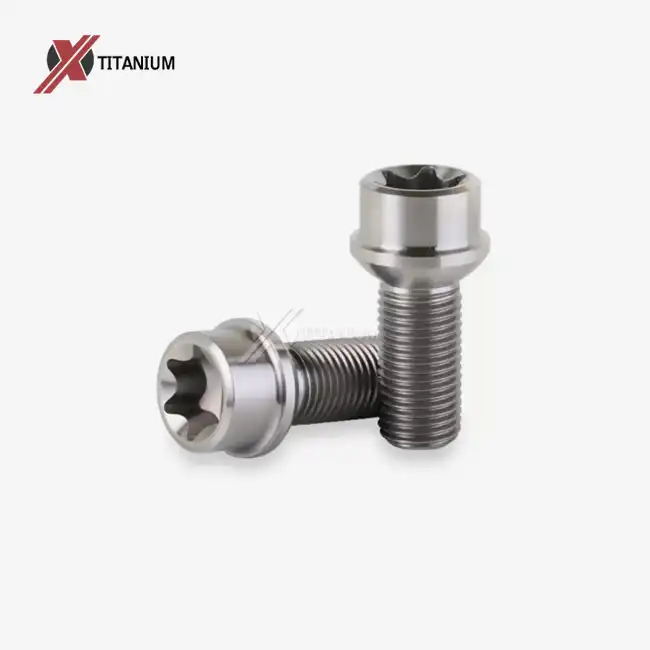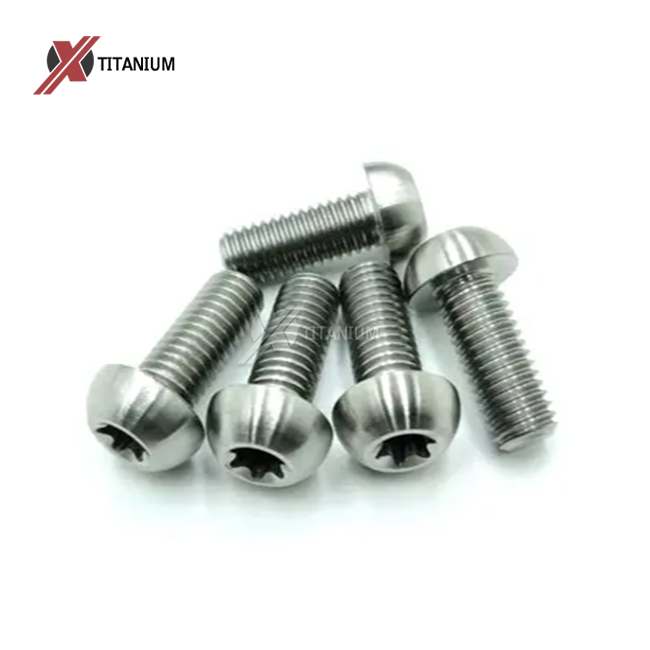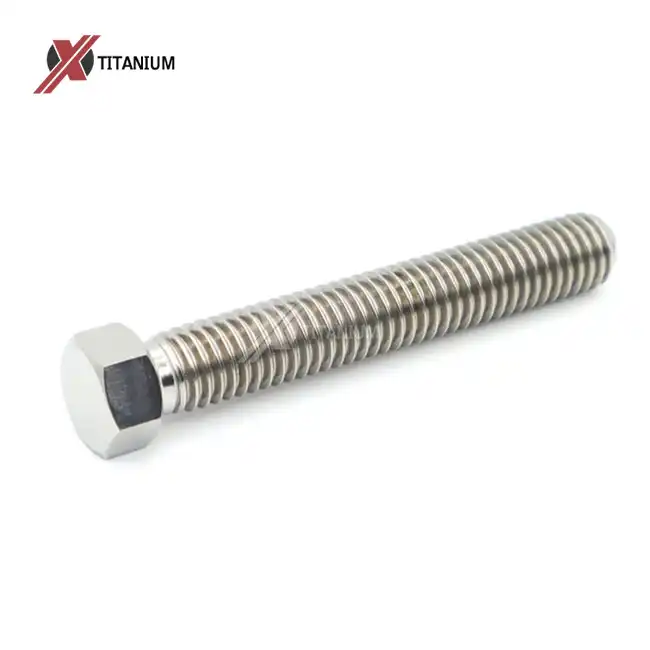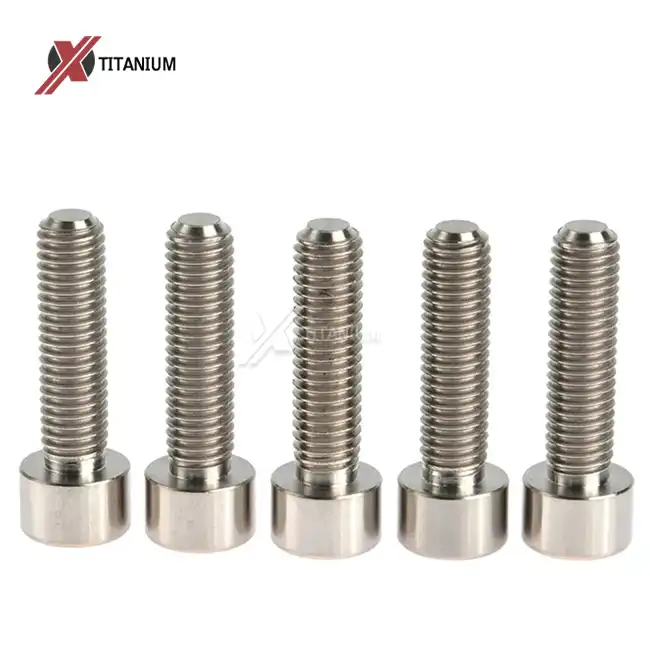Titanium stud bolts have gained considerable attention across various industries due to their unmatched properties, including exceptional strength, lightness, and resistance to corrosion. They are essential in heavy-duty applications like aerospace, automotive, and marine industries, where high performance and reliability are crucial. This blog aims to delve into why titanium stud bolts are increasingly becoming the go-to choice for industries that require high-strength, durable, and corrosion-resistant fasteners.
Whether you are working on a high-pressure reactor, building aerospace components, or designing structures exposed to the harsh marine environment, understanding the strengths and applications of titanium stud bolts will guide you in making informed decisions. This comprehensive guide will explore the properties of titanium, compare it with other fasteners, and provide insights on how to select the right bolts for your application.
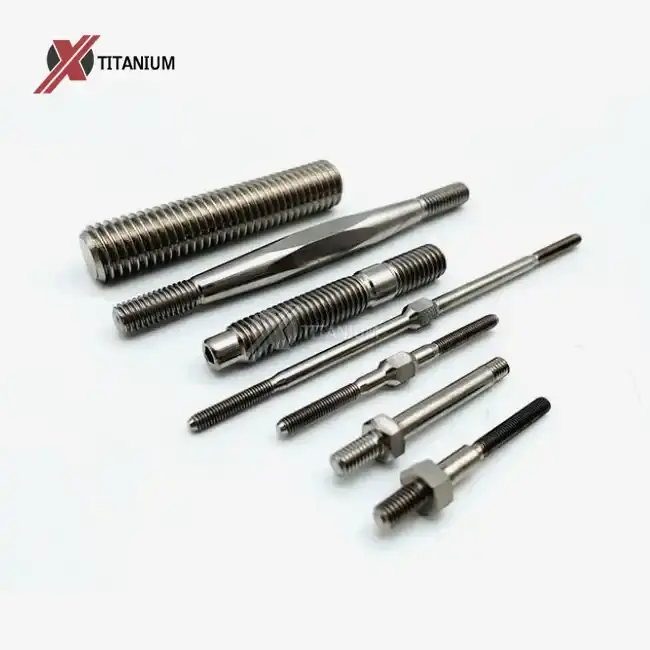
How Do Titanium Stud Bolts Compare to Other Metal Fasteners in Terms of Strength and Durability?
When it comes to choosing fasteners for heavy-duty applications, two critical factors must be considered: strength and durability. While there are numerous fasteners made from materials like stainless steel, alloy steel, and aluminum, titanium stud bolts outshine them in many respects.
Titanium vs. Stainless Steel
Stainless steel is a commonly used material for fasteners, known for its relatively high strength and corrosion resistance. However, titanium surpasses stainless steel in several key areas. Titanium alloys, specifically Grade 5 titanium (Ti-6Al-4V), are stronger than most grades of stainless steel, offering a higher strength-to-weight ratio. This makes titanium stud bolts particularly valuable in industries like aerospace, where weight reduction without compromising strength is crucial.
Moreover, titanium has a natural oxide layer that provides excellent corrosion resistance, even in aggressive environments such as saltwater and chemicals. In comparison, stainless steel may corrode over time under similar conditions, especially when exposed to chloride environments.
Titanium vs. Alloy Steel
Alloy steel is often used for high-strength applications, but it typically lacks the same level of corrosion resistance as titanium. While alloy steel fasteners may be stronger under specific conditions, they are prone to rusting and corrosion, reducing their longevity and performance in marine or chemical environments.
Titanium stud bolts, on the other hand, exhibit excellent fatigue resistance, which makes them ideal for applications where vibrations or fluctuating loads are common, such as in the automotive and aerospace industries. Additionally, titanium's higher resistance to high temperatures adds another layer of reliability, making it the better choice for high-stress applications.
Titanium vs. Aluminum
Aluminum is lightweight and resistant to corrosion, but it is not as strong as titanium, particularly in high-stress environments. Titanium's strength, combined with its low weight, makes it ideal for applications that require both durability and performance, like in aerospace engineering. Aluminum, while good for certain applications, cannot offer the same long-term reliability as titanium under extreme conditions.
What Are the Key Advantages of Using Titanium Stud Bolts in Corrosive Environments?
Corrosion is a significant concern when choosing fasteners for applications exposed to harsh environments. Whether it's the chemical processing industry, marine applications, or offshore oil rigs, selecting the right fastener is essential for ensuring safety and minimizing maintenance costs.
Superior Corrosion Resistance
Titanium’s ability to resist corrosion is one of its most celebrated properties. When exposed to oxygen, titanium forms a thin oxide layer that acts as a protective barrier, preventing the underlying metal from further corrosion. This property makes titanium stud bolts the preferred choice in industries dealing with harsh chemicals, seawater, or extreme temperatures.
For example, in the marine industry, where fasteners are constantly exposed to saltwater, titanium stud bolts remain unaffected by the corrosive effects of salt. This property is particularly useful in constructing ships, underwater pipelines, and offshore platforms. In contrast, steel-based fasteners would quickly degrade in such environments, leading to structural failures.
Resistance to Chemical Attack
In addition to saltwater, titanium stud bolts are resistant to a wide range of chemicals, including acids and alkalis. This makes them an excellent choice for the chemical processing industry, where fasteners may come into contact with aggressive substances like hydrochloric acid, sulfuric acid, and nitric acid.
Unlike other materials, titanium’s corrosion resistance extends across a broad spectrum of aggressive chemicals, ensuring that the fasteners retain their structural integrity over time. This is a significant advantage in industries where equipment failure can lead to costly downtime and environmental hazards.
Longer Lifespan
Due to titanium’s resistance to corrosion and wear, titanium stud bolts typically offer a much longer lifespan than other fasteners. This longevity not only reduces maintenance costs but also increases the reliability of the equipment in which they are used. This makes titanium stud bolts particularly beneficial in industries where the cost of replacing or repairing fasteners can be prohibitive, such as in the aerospace and automotive sectors.
How Do You Choose the Right Titanium Stud Bolts for Your Specific Application Needs?
Choosing the right titanium stud bolts involves considering several factors, such as the material grade, the environment in which the bolts will be used, and the mechanical properties required for the specific application.
Selecting the Correct Titanium Grade
Titanium is available in different grades, each with unique properties suited to specific applications. The most common grades of titanium used in fasteners are Grade 2, Grade 5 (Ti-6Al-4V), and Grade 7. Grade 2 is the purest form of titanium and offers good corrosion resistance but lower strength. Grade 5 (Ti-6Al-4V), on the other hand, is an alloy with a high strength-to-weight ratio, making it ideal for heavy-duty applications. Grade 7 is similar to Grade 2 but with enhanced corrosion resistance, making it suitable for chemical processing and marine applications.
Consider the Environmental Conditions
The environment in which the titanium stud bolts will be used is a critical factor in determining the appropriate material. If the fasteners will be exposed to seawater, chemicals, or extreme temperatures, titanium grades that offer superior corrosion resistance and high-temperature performance should be chosen.
For marine applications, Grade 7 titanium is often preferred for its exceptional resistance to chlorides and its ability to withstand the harsh conditions found in saltwater. For aerospace and automotive applications, Grade 5 titanium is frequently chosen for its combination of strength and lightweight properties.
Size and Thread Specifications
The size and thread specifications of titanium stud bolts should also be carefully considered. The bolts must be able to accommodate the required load and fit securely within the designated assembly. It is essential to consult engineering guidelines and standards for specific thread sizes, lengths, and diameters that are appropriate for the application.
Conclusion
Titanium stud bolts offer an array of benefits for heavy-duty applications across a range of industries. Their unmatched strength-to-weight ratio, exceptional corrosion resistance, and ability to withstand extreme environments make them the ideal choice for critical applications in aerospace, automotive, marine, and chemical industries. By understanding the advantages of titanium and carefully selecting the appropriate grade and size for your specific needs, you can ensure long-lasting, reliable performance for your equipment and structures.
As industries continue to demand higher performance materials, titanium stud bolts will remain a critical component in the construction of advanced machinery, equipment, and structures. Whether you are involved in engineering, manufacturing, or maintenance, titanium stud bolts provide the durability, strength, and reliability necessary for success in today’s high-performance environments.
References
Smith, J.R. (2021). "Advanced Materials in Aerospace: The Role of Pure Titanium". Journal of Aerospace Engineering, 45(3), 234-248.
Johnson, A.M. & Williams, P.K. (2020). "Biocompatibility of Titanium in Medical Implants: A Comprehensive Review". Biomaterials Science, 8(12), 3301-3320.
Chen, Y., et al. (2019). "Corrosion Behavior of Pure Titanium in Marine Environments". Corrosion Science, 152, 120-133.
Patel, R.N. & Thompson, L.E. (2022). "Manufacturing Processes for High-Quality Titanium Plates". Advanced Materials Processing, 180(5), 45-58.
Garcia, M.S., et al. (2023). "Applications of Pure Titanium in Sustainable Architecture". Architectural Engineering and Design Management, 19(2), 178-195.
